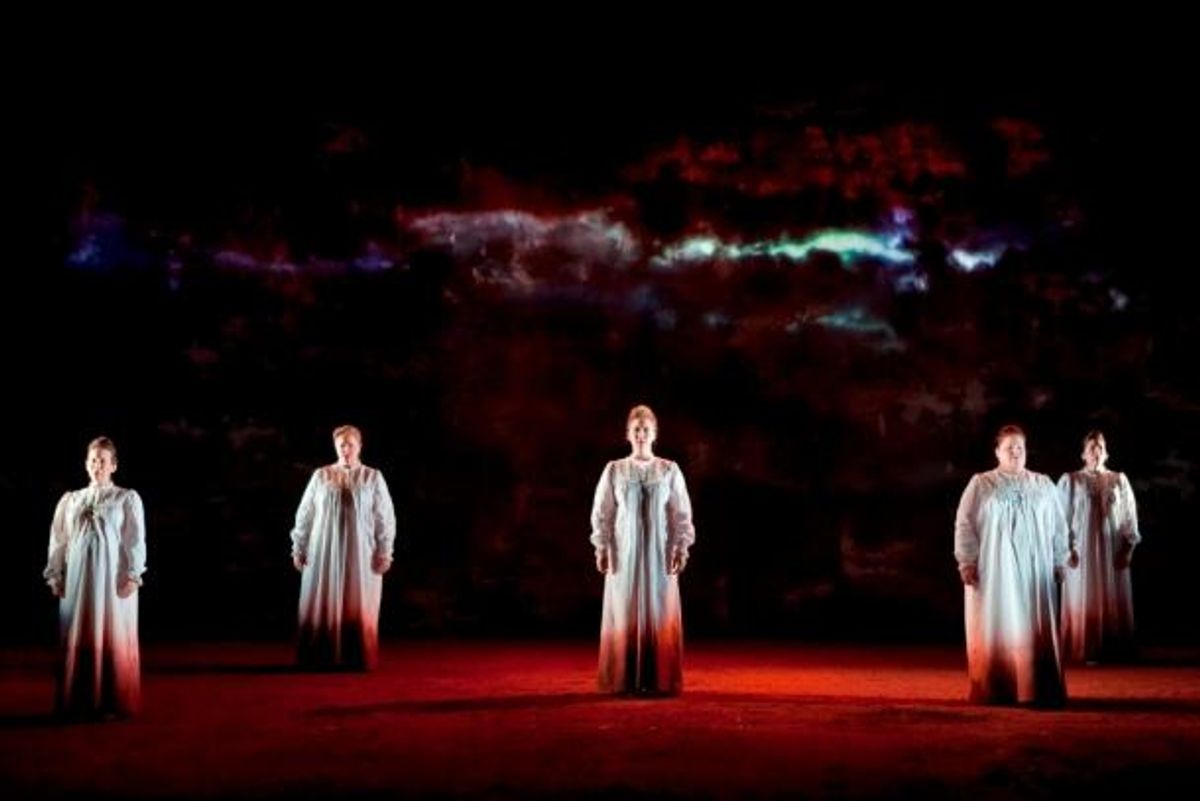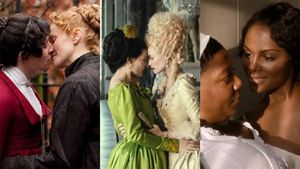Mormonism is on a hot streak: It's the subject of a blockbuster musical, presidential candidate debates, and the strange and puzzling ad campaigns that proselytize from the back of NYC taxis for "Mormon.org" (a visit to the site finds, sandwiched between stories about mormons "going green" and winning women's surfing championships, questions like, "What is my purpose in this life?"). The same is true for Mormonism's fundamental, polygamous sub-sects, with HBO's Big Love and TLC's Sister Wives pawing at the ratings like a sister wife in heat. A new chamber opera, Dark Sisters, the brainchild of composer Nico Muhly and playwright Stephen Karam (co-commissioned and co-produced by Gotham Chamber Opera, Music-Theatre Group, and the Opera Company of Philadelphia) is the latest to join the fray, opening last Wednesday and offering a dramatic treatment of the Fundamentalist Church of Jesus Christ of Latter Day Saints (FLDS) and their famously polygamous ways.
Dark Sisters' plot focuses on the aftermath of a government raid on an FLDS community, based rather explicitly on the 2008 raid of the YFZ Ranch near Eldorado, Texas, which involved the removal of over 400 children by child protective services, and resulted in a complex and nationally publicized custody battle-cum-civil rights dispute. In Dark Sisters, the raid is a catalyst for heroine Eliza's descent into crisis, as she begins to question her faith and her identity as one of five sister wives, and to summon the strength to change her life, with sights set on reuniting with her daughter, Lucinda, who's among the children removed by welfare agencies.
Karam and Muhly sensitively make a point to examine the sister wives on both individual and collective levels. The result is an entirely soprano warp and weft whose musical fabric is not unlike the texture of the story's physical landscape: for the most part constant and flat (and sometimes this stasis is not entirely engaging), but thrillingly punctuated by dramatic, extreme peaks and mesas, where individuals burst forth from musical and narrative assimilation to assert their presence and impressions. Muhly's score uses Mormon hymns and pioneer folk songs as raw material to write music that feels elemental and expresses with woozy strings and twitchy, precise (well, almost--the orchestra could have been more nimble) counterpoints profound precariousness and pervasive emotional, spiritual, and physical tension.
Each sister wife stands for a different FLDS archetype, and one certainly gets the sense that each has her own difficulties trying to "Keep Sweet," the wives' collective mantra, a phrase that each woman admonishes, mutters, reminds, implores, and insists throughout the opera, in a quintet form that Muhly terms "a girl group kind of sound, very Ronettes." Mezzo-soprano Margaret Lattimore's Presendia is the breadstick-baking media whore to sprightly-voiced soprano Jennifer Zetlan's Zina, the manic seamstress. In the first act, the two duet a hilarious craft-off, making light of group dynamic girl-drama, but avoiding oversimplification; as Muhly notes, sharing a husband is "complicated--it's fetishistic and totemic, rather than bitch-keep-your-hands-off-my-man."
Ruth, played by Eve Gigliotti, is the ethereal depressive whose older age and fertility expiration date albeit assure her imminent obsolescence to their husband, The Prophet, and the aforementioned Eliza, played by the lyrical, expressive soprano Caitlin Lynch, is the thoughtful rebel. Amera is the "true believer," and Jennifer Check delivers some of the opera's most rapturous moments in this role, with effulgent passages that extol the rich promises of an FLDS afterlife in the celestial kingdom. Karam agrees, and is quick to exclaim of these moments, "I would testify right then and there!" Gestures like this smartly give equal aesthetic weight to the zealous and the dissenting alike, allowing viewers to assume multiple perspectives and avoid hasty conclusions. The creators are invested in telling a complete story, trying to avoid, as Muhly puts it, "looking like a bunch of East-coast fags playing with Barbies in prairie dresses."
Dark Sisters' visual elements thrive within the chamber opera form, doing much with very little. Tiny, bright cerulean garments stand for lost children against the ominous cloudscapes that bubble and boil, almost imperceptibly, into Turner-level light tableaux, and the rocky, nearly Martian red-orange stage that conjures the dusty western landscape. Costumes are lovely and simple, either unifying the group or slightly differentiating, ranging from white nightgowns to monochromatic shift dresses (in the first act, with gorgeous hems that ombre fade from pale shades of blue to the red-orange mineral color coating the stage--in short, girlfriends be WERKIN'). The layered projection scrims and screens explode the theatrical space, quite literally, into the realms of the heavenly.
Muhly's and Karam's thoughtful approach is unquestionable, but it is hard to say that the account is without innuendo. There is fruitful social subtext, as the persecution associated with unconventional marital practices draws obvious parallels to gay marriage initiatives. Dark Sisters tackles many questions that have direct relevance to same-sex marriage advocacy: What constitutes a marriage? What is a family? Is adultery polygamy? Muhly cites his interest in interrogating these narrowly-defined institutions: "When you grow up gay, you learn pretty quickly that you're going to have to make up your own family; you're going to have to improvise a bit." Dark Sisters' story is complicated and devastating, and the women often come off as heroic in their attempts to exist in situations mostly out of their control. As Muhly points out, "These are women who don't have any way of making a living. It may seem like, well, why don't they just drive down to a Walmart and figure things out? But these are also women who by their mid-20s have four or five children, who they legally cannot take away any more than the authorities can." While Karam communicated that the story is more "about people than about some political movement," it is really, in a powerful way, about both.
Dark Sisters is directed by Rebecca Taichman and conducted by Neil Goren. It is currently playing at the Gerald W. Lynch theater through November 19, and tickets can be purchased here. See our profile of Dark Sisters creator Nico Muhly in Out magazine, here.



















































































